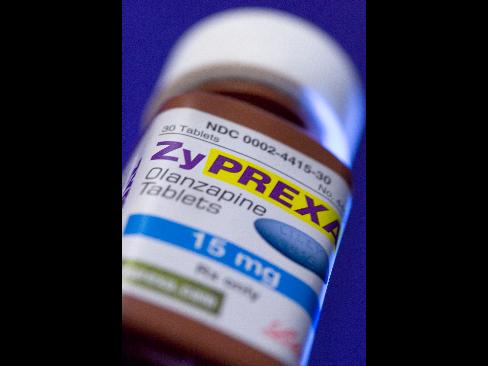The documents also revealed Lilly officials wrote medical journal studies about Zyprexa and then asked doctors to put their names on the articles, a practice called “ghostwriting.”
Lilly employees compiled a guide to hiring scientists to write favorable articles, complained to journal editors when publication was delayed and submitted rejected articles to other outlets, according to the documents.
Criminals!
The drug has never been approved for use with dementia patients, according to the FDA’s Web site.

A file photograph of Eli Lilly & Co.’s schizophrenia medication, Zyprexa, in Cambridge, Massachusetts. Photographer: JB Reed/Bloomberg News
June 12 (Bloomberg) — Eli Lilly & Co. urged doctors to prescribe Zyprexa for elderly patients with dementia, an unapproved use for the antipsychotic, even though the drugmaker had evidence the medicine didn’t work for such patients, according to unsealed internal company documents.
In 1999, four years after Lilly sent study results to the U.S. Food and Drug Administration showing Zyprexa didn’t alleviate dementia symptoms in older patients, it began marketing the drug to those very people, according to documents unsealed in insurer suits against the company for overpayment.
Regulators required Lilly and other antipsychotic drug- makers in April 2005 to warn that the products posed an increased risk to elderly patients with dementia. The documents show the health dangers in marketing a drug for an unapproved use, called off-label promotion, said Sidney Wolfe, head of the health research group at Public Citizen in Washington.
“By definition, off-label means there is no clear evidence that the benefits of a drug outweigh the risks,” Wolfe said. “The reason why off-label promotion is illegal is that you can greatly magnify the number of people who will be harmed.”
In 1999, when Lilly began its marketing push, Zyprexa’s only approved use was for patients suffering from schizophrenia, according to the FDA. In 2008, Zyprexa was Lilly’s best-selling drug, with $4.7 billion in sales, while antipsychotics as a group topped U.S. drug sales last year, with $14.6 billion.
Seven Studies
In a request for a December 2003 meeting over a proposed label change, Lilly told the FDA that data from seven studies showed Zyprexa didn’t alleviate symptoms of Alzheimer’s or other dementia.
The studies found death rates among older dementia patients taking Zyprexa were “significantly greater” than those who didn’t get the medicine, the company said, according to the unsealed documents.
Read moreBig Pharma: Eli Lilly Sold Drug for Dementia Knowing It Didn’t Help, Files Show